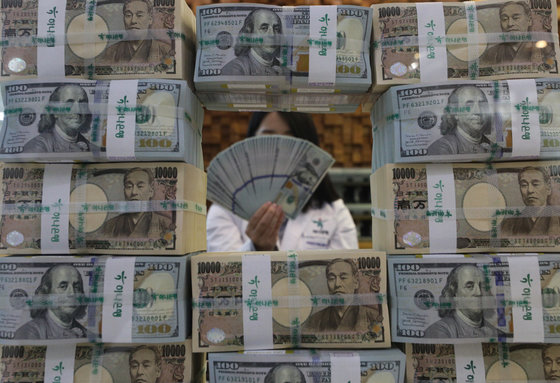On the 31st, Japan’s central bank, the Bank of Japan, revised its monetary easing policy again for the first time in three months since July of this year. This move is interpreted as a result of the deepening of the yen’s weakness and the growing burden of inflation as the interest rate gap with the United States continues to widen. There is analysis that Japan, which has long maintained negative interest rates to stimulate the economy, is changing its existing policy direction.
The U.S. central bank, the Federal Reserve System (Fed), which has pursued an aggressive policy of raising interest rates since last year, is expected to freeze its benchmark interest rate at the Federal Open Market Committee (FOMC) to be held on the 31st and 1st of this month. Instability in the global financial market is expected to increase for the time being due to political instability in the Middle East due to the war between Israel and the Palestinian armed group Hamas, rising international oil prices, and rising U.S. Treasury bond interest rates.
At the financial policy decision meeting on the 31st, the Bank of Japan raised the upper limit target for the fluctuation of the 10-year government bond interest rate, an indicator of long-term interest rates, from 0.5% per year to 1.0% per year. It was decided to allow a certain amount of exceeding 1.0%.
The Bank of Japan explained the reason by saying, “Strictly suppressing the long-term interest rate ceiling has a powerful effect, but the side effects can also be significant.” If the rise in interest rates is suppressed too much, the interest rate gap with the United States will widen, deepening the weakness of the yen against the dollar. A lower yen has the positive effect of increasing Japan’s export competitiveness and attracting foreign tourists, but it has the side effect of fueling rising prices and aggravating the hardships of life for the people. In other words, this is interpreted to mean that there was a need to revise the policy because the weak yen had as much negative impact as the positive impact on the Japanese economy.
This is the third time in the past year that the Bank of Japan has revised its monetary easing policy. In December last year, the long-term interest rate cap was expanded from 0.25% to 0.50%, carrying out a ‘de facto interest rate increase’. In July of this year, the interest rate for unlimited purchases of 10-year government bonds was raised from 0.50% to 1.0%. All three moves have the effect of raising market interest rates.
Japan is adopting ‘negative interest rates’, which keep short-term interest rates at -0.1%, as a means of stimulating the economy to escape from the ‘lost 30 years’. However, as the interest rate gap with the United States and Europe, which are implementing strong austerity policies, continued to widen, the weak yen phenomenon worsened. It has been pointed out that Japan’s financial market function has also weakened as overseas investment capital flows out to other markets where high profits are expected due to high interest rates.
 An employee is organizing dollars and yen at the counterfeit and forgery response center of Hana Bank in Jung-gu, Seoul. News 1
An employee is organizing dollars and yen at the counterfeit and forgery response center of Hana Bank in Jung-gu, Seoul. News 1However, on the 31st, the yen-dollar exchange rate in the Tokyo foreign exchange market was 150.25 yen, increasing compared to the previous day (the value of the yen fell). The Nippon Keizai Shimbun analyzed, “It appears that the Bank of Japan will maintain a framework of financial easing for the time being and keep an eye on prices and the economic situation.” This means that the policy direction has changed, but the pace will be gradual.
This week, the ‘Super Week’ of the central banks of major countries continues, with the Bank of Japan and the Federal Reserve, as well as the Bank of England (on the 2nd) deciding on monetary policy. Wall Street experts believe that the Federal Reserve is likely to freeze the benchmark interest rate not only at the November FOMC meeting but also at the December FOMC meeting. The Wall Street Journal (WSJ) said, “The borrowing costs of households and businesses are increasing due to the recent surge in long-term U.S. Treasury yields,” and predicted that the Federal Reserve will not necessarily raise interest rates as this has virtually the same effect as raising interest rates.
The upward pressure on international oil prices due to political instability in the Middle East is a major variable in the international financial market. The World Bank predicted on the 30th of last month that if this war unfolds in the worst-case scenario, a situation similar to the first oil crisis in the 1970s will occur, with global oil supply decreasing by 6 to 8 million barrels per day and oil prices rising to $140 to $157 per barrel. It was predicted that
The impact of instability in the international financial market on the domestic market is expected to be significant. The Bank of Korea recently diagnosed that “due to the strong dollar, the won-dollar exchange rate may rise and high exchange rate volatility may continue.”
Tokyo =
New York =
Source: Donga
Mark Jones is a world traveler and journalist for News Rebeat. With a curious mind and a love of adventure, Mark brings a unique perspective to the latest global events and provides in-depth and thought-provoking coverage of the world at large.